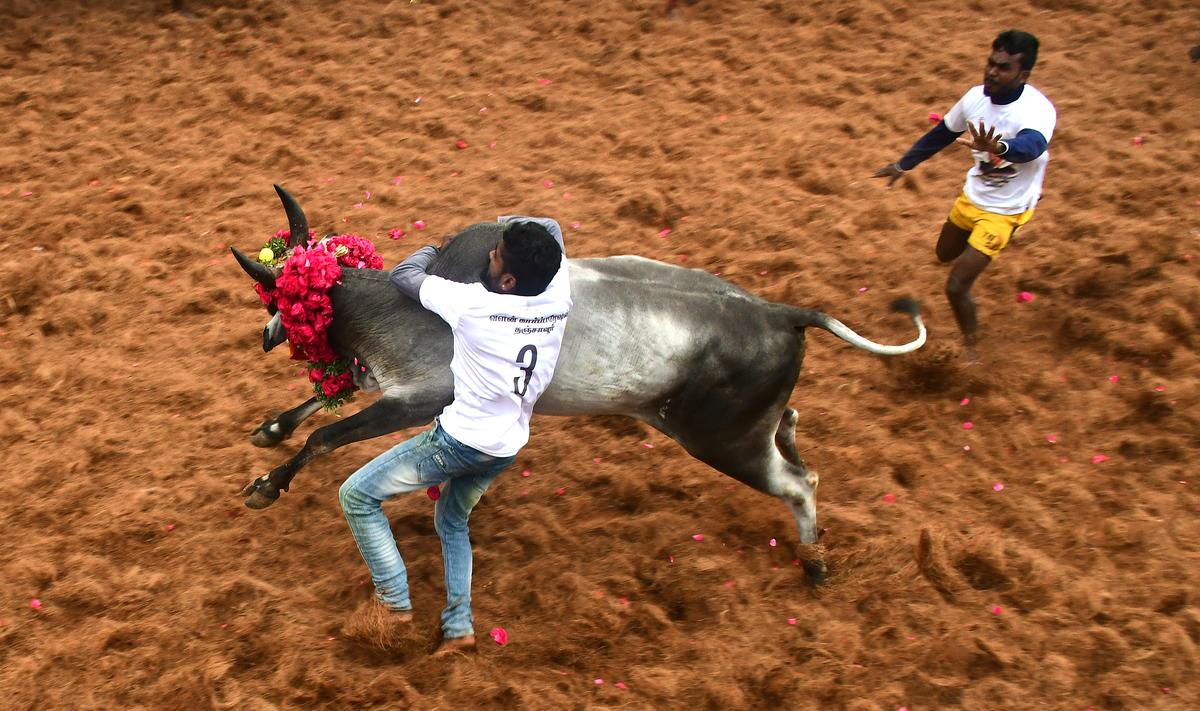Live Classes

Come Pongal and many parts of Tamil Nadu are alive with preparations for jallikattu, a traditional sport involving bulls. On December 8, a five-member Constitution Bench of the Supreme Court reserved its verdict on a batch of pleas challenging the Tamil Nadu law allowing jallikattu. The court is expected to give its judgment before the commencement of this year’s event, which goes on for nearly four months in various parts.
Jallikattu Case
It is likely to rule on the validity of the Prevention of Cruelty to Animals (Tamil Nadu Amendment) Act, 2017, which does not talk of the “taming of bulls” while giving legal sanction to jallikattu. Though the traditional sport was not allowed for a few years thanks to the apex court’s ruling in May 2014, the demand for its revival assumed serious proportions soon after the death of Chief Minister Jayalalithaa in December 2016.
As the court had declared void the Tamil Nadu Regulation of Jallikattu Act, 2009, which referred to the “taming of bulls”, the framers of the 2017 law defined jallikattu as “an event involving bulls conducted with a view to follow tradition and culture”. On hearing petitions against the latest law, the court had sought to address the questions of whether jallikattu should be granted constitutional protection as a collective cultural right under Article 29 (1); and whether the 2017 law and rules “perpetuate cruelty to animals” or were a means to ensure “the survival and well-being of the native breeds of bulls”.
Faith and Sensitivity
In a democracy, no one can overlook the cultural sensitivity of the people. Six years ago, the perception that those in power, both at the Centre and in the State, did not respect this factor gained ground, compelling the Union and the State governments to come up with a State-specific amendment to the Prevention of Cruelty to Animals Act, 1960, a Central law. The amendment, allowing the event subject to rules and regulations, had ended the crisis that had engulfed the State then in the wake of a huge assembly of people on the Marina Beach for days together. But the revised law, by itself, could not ensure that no human lives were lost, let alone prevent instances of torture to the animal.
Now What Next
There is a need to reinforce stricter enforcement of regulations. Also, the bureaucracy should sensitise local communities to the need for the safe and smooth conduct of jallikattu. Every traditional practice undergoes changes over time and jallikattu is no exception to this rule. This message should be conveyed forcefully to all the stakeholders.
Why in News
A Constitution Bench of the Supreme Court reserved for judgment a batch of petitions seeking to strike down a Tamil Nadu law which protects Jallikattu by claiming that the bull-taming sport is a cultural heritage of the State and is protected under Article 29 (1) of the Constitution.
Jallikattu
Jallikattu is a traditional sport that is popular in the Indian state of Tamil Nadu.
The sport involves releasing a wild bull into a crowd of people, and the participants attempt to grab the bull's hump and ride it for as long as possible, or attempt to bring it under control. It is celebrated in the month of January, during the Tamil harvest festival,
Pongal.
why concern
Jallikattu Legal Battle
So, is it legal or banned now?
Download pdf to Read More